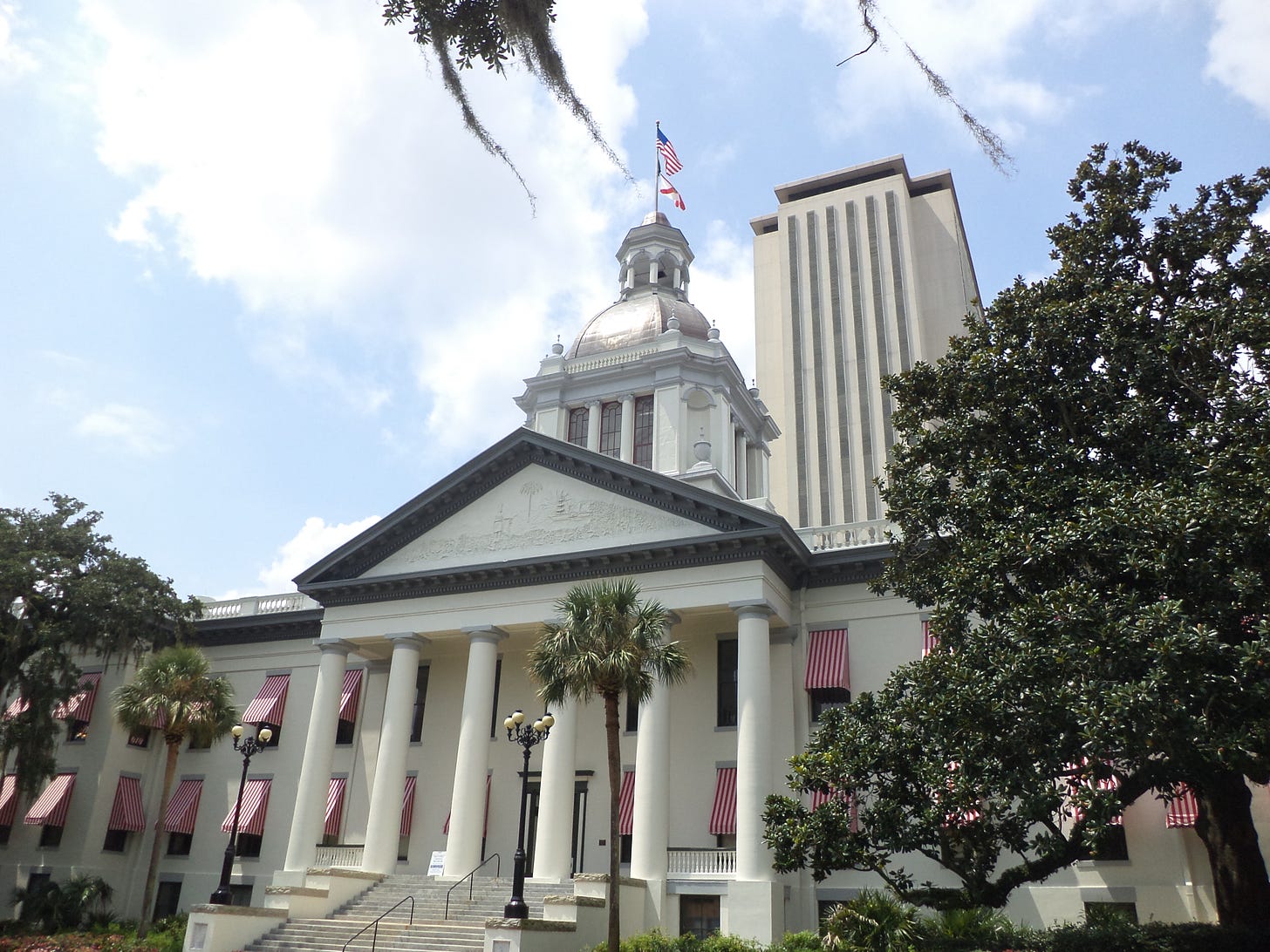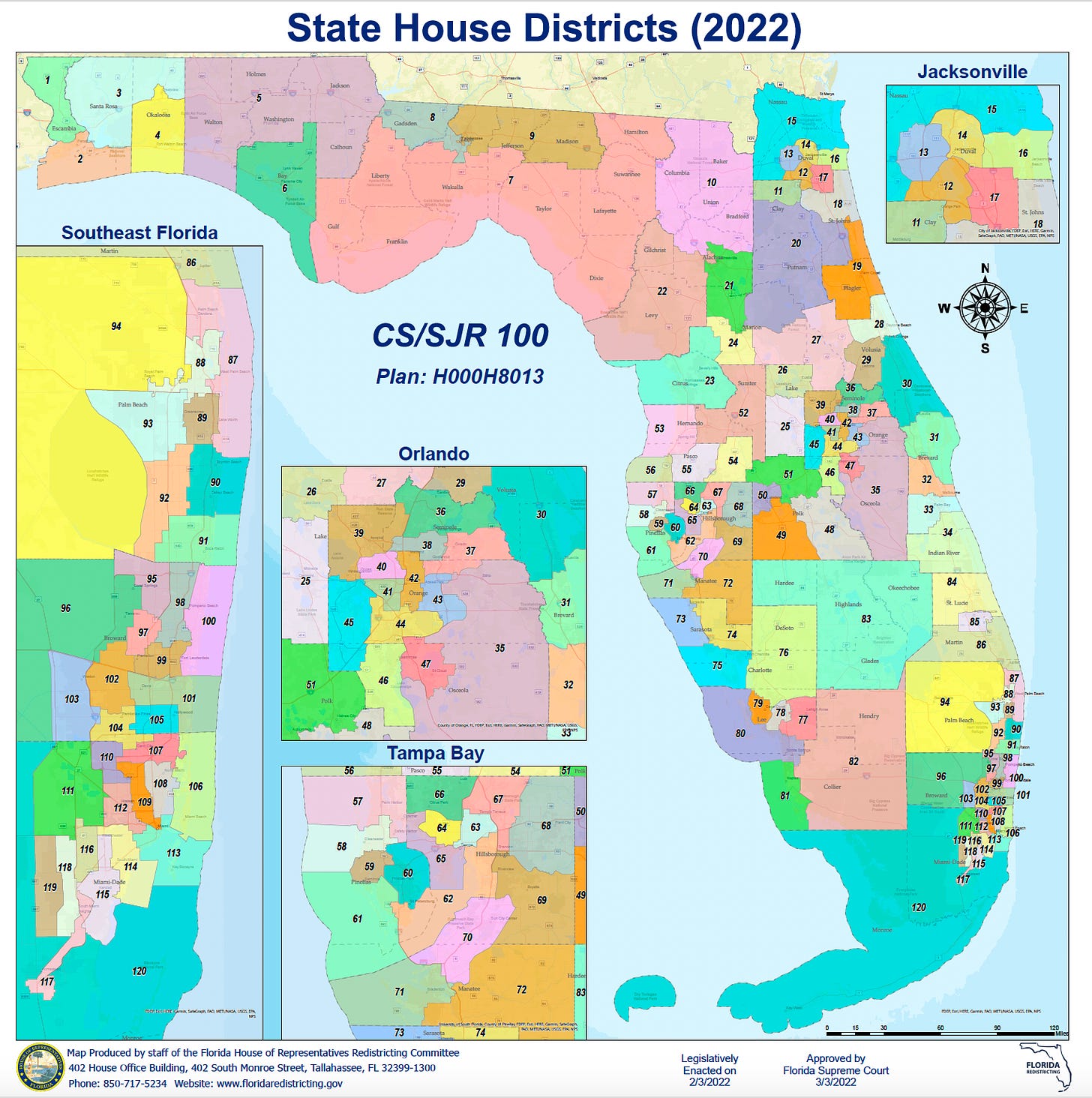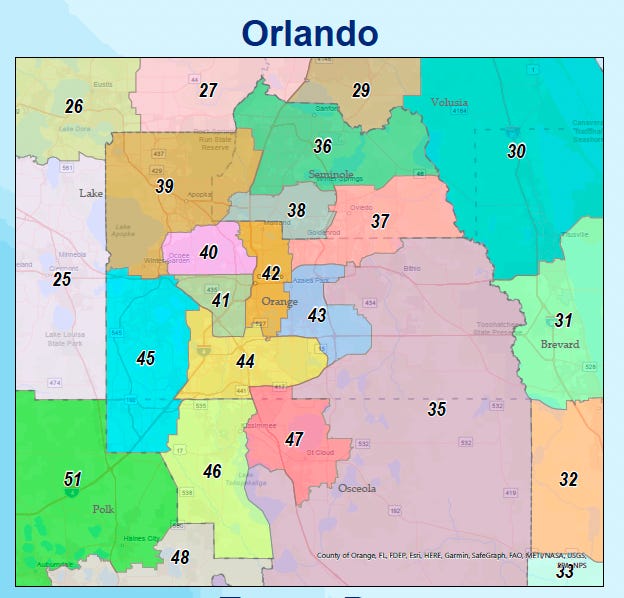The races that will decide the fate of the Republican supermajority in Florida
Florida Republicans have total control in Tallahassee right now. Voters in Orlando can decide whether they keep it.

This is Seeking Rents, a newsletter and podcast devoted to producing original journalism — and lifting up the work of others — about Florida politics, with an emphasis on the ways that big businesses and other special interests influence public policy in the state. Seeking Rents is written by veteran investigative journalist Jason Garcia, and it is free to all. But please consider a voluntary paid subscription, if you can afford one, to help support our work.
Last year, Florida’s Republican-controlled state Legislature passed a controversial new law concealing many of Gov. Ron DeSantis’ travel records.
Republican leaders in Tallahassee claimed they were simply trying to ensure the governor’s safety when he flies around Florida and across the country. But DeSantis immediately began exploiting the new law, using it to hide even basic details of his travel — like how much taxpayer money he spends on his trips.
This could only happen because Republicans command a supermajority in the state Capitol. The Florida Constitution requires any new law sealing public records to pass both chambers of the Legislature by a two-thirds vote — a margin that Republicans could clear all by themselves after a red wave election in 2022 in which they captured 85 seats in the 120-member state House and 28 seats in the 40-member state Senate.
Senate Bill 1616 passed into law six months later even though not a single Democrat in Tallahassee voted for it.
But that Republican supermajority is back on the ballot this fall.

Most Florida voters are frozen out out of this fight. That’s because of gerrymandering, which has rendered the vast majority of House and Senate districts in Florida beyond the reach of one party or the other (To understand how gerrymandering works: Imagine taking an equal number of Republican and Democratic voters and then dividing them into 15 districts in which 60 percent of the voters are Republicans and five districts in which 80 percent of the voters are Democrats.)
But if you squint, you can spot about 15 potentially competitive legislative races scattered across the state. These are the races that will decide the fate of the Florida Legislature for next two years — whether Republicans retain absolute control in the state Capitol or whether Democrats claw back a bit of power.
So…where are they?
Orlando
Let’s start in central Florida, which has basically half of Florida’s competitive legislative races this year. In fact, there are so many potential swing seats in the region that Orlando voters could end up deciding the Republican supermajority all by themselves. (And that’s on top of a slate of pivotal county campaigns.)
The top races are probably House District 37, which is on the east side of metro Orlando and includes the University of Central Florida, and House District 45, which is on the west side and takes in Walt Disney World. Both are currently held by first-term Republicans: Rep. Susan Plasencia (R-Orlando) and Rep. Carolina Amesty (R-Windermere).
Plascencia pulled off one of the most surprising wins of the 2022 cycle when she ousted former Democratic Rep. Carlos Guillermo Smith (though Smith is about to return to Tallahassee as a state senator). Now she’s trying to hang on to the seat against Nate Douglas, a policy researcher who has worked with the LGBTQ+ rights group Equality Florida.
Amesty, who once stood proudly next to Ron DeSantis as he “joked” about building a prison at Disney World, was always going to face a tough re-election race in Disney’s home district. And then she went and got indicted for forgery. She’s being challenged by Leonard Spencer, a former Disney executive who now works with Amazon.
The closest race in central Florida two years ago occurred in House District 47, which includes Osceola communities that are home to many of the region’s tourism workers. Republican Rep. Paula Stark (R-St. Cloud), who won the seat in 2022 by fewer than 1,000 votes (1.8 percentage points), faces Maria Revelles, a union organizer.
After those three seats, Democrats next-best shot at a pickup is probably House District 38 in Seminole County, where three-term incumbent Rep. David Smith (R-Winter Springs) faces Sarah Henry, who works for a drug-disposal nonprofit. It’s a rematch of a 2022 race that Smith won by about 3,000 votes (4.6 percentage points).
Democrats also seem to think they have a shot in House District 39, which is anchored by the small city of Apopka. Rep. Doug Bankson (R-Apopka), an author of some renown, faces Marsha Summersill, a divorce and custody lawyer.
But Republicans aren’t entirely on defense in Orlando.
They’re targeting House District 35, which includes part of Orlando’s fast-growing Lake Nona region and which Rep. Tom Keen (D-Orlando) narrowly won in a low-turnout special election just eight months ago.
That was a Democratic flip after the previous incumbent, former Republican Rep. Fred Hawkins, joined the parade of Republican politicians becoming presidents of Florida colleges under Ron DeSantis. And it trimmed the GOP majority in the House to 84.
Keen faces Erika Booth, a former Osceola County School Board member. It’s a rematch of that January special election, which Keen won by about 600 votes (2.6 percentage points).
South Florida
The other pocket of competitive races is in south Florida, where the battlefield is bracketed by two big races in Palm Beach County and two in Miami
One of the key Palm Beach County contests is in Boca Raton-based House District 91, where Rep. Peggy Gossett-Seidman (R-Highland Beach) faces Jay Shooster, a social-justice attorney.
The other is in House District 93, which includes the wealthy enclave of Wellington. Rep. Katherine Waldron (D-Willington) barely survived Florida’s red wave in 2022, winning the seat by 1.2 percentage points at the same time as Ron DeSantis carried it by nearly 4 points. She’s trying to hang on again, this time against Anne Gerwig, a former Willington mayor.
Then you move south to a pair of seats in the heart of Miami.
First, there’s House District 106, a coastal seat that stretches from Aventura to South Beach.
That’s where first-term Rep. Fabián Basabe (R-Miami Beach) won the closest House race in the state in 2022 — and then spent much of the two years enveloped in controversy and drama. Basabe squeaked into office by 240 votes (0.4 percentage points) and now must fend off Joe Saunders, a former Democratic member of the state House who used to represent a district in Orlando. (Basabe may be hoping for an assist from a controversial spoiler candidate.)
And then on the other side of Biscayne Bay, amid the high-rise office buildings and luxury condo towers of downtown Miami, Rep. Vicki Lopez (R-Miami) faces Jackie Gross-Kellogg, a nature center program manager, in House District 113.
There could also be a fifth South Florida contest worth keeping an eye on. It’s in House District 94, a largely rural seat that covers some of sugar country around Lake Okeechobee.
Currently held by a Republican being forced out by term limits, the seat probably won’t flip. But the race pits a particularly far-right Republican — Meg Weinberger, a Moms for Liberty leader nicknamed “MAGA Meg” — against a reasonably well-funded Democrat in former Palm Beach Gardens Mayor Rachelle Litt.
Tampa Bay
There’s not nearly as much to see anywhere else in the state — not even in Tampa Bay, which has in past election cycles rivaled Orlando as the place with the most swing seats in play.
The one clear Tampa Bay battleground is in House District 60, which covers north St. Petersburg and is where Rep. Lindsay Cross (D-St. Petersburg) faces what looks like a formidable challenge from Ed Montanari, a member of the St. Pete City Council.
There’s an intriguing second race right across the water in House District 65, which takes in South Tampa. Rep. Karen Gonzalez Pittman (R-Tampa) faces Ashley Brundage, the founder of a professional development firm who would become Florida’s first transgender lawmaker if she wins.
North Florida
Lastly, there are two House races to note in North Florida.
The first is House District 9, which stretches from the state Capitol to the Georgia border. It’s another place where Republicans are on offense, as Rep. Allison Tant (D-Tallahassee) tries to fend off Spencer Brass, a commercial real-estate developer.
Meanwhile, in Florida’s other sad-sack college football town, there’s a potentially competitive race in House District 22, which runs from Gainesville to the Gulf of Mexico and is open because the Republican incumbent is being ousted by term limits. Democrat David Arreola, a former Gainesville city commissioner, is squaring off against Republican Chad Johnson, a former Gilchrist County commissioner.
Hey! What about the Senate?
The most hard-fought legislative battle in all of Florida probably won’t happen in any of those House races I just ran through. It’s likely to take place instead in Senate District 3, a sprawling North Florida seat that spans from Port St. Joe to Cross City and includes Tallahassee and the oyster town of Apalachicola.
That’s where freshman Sen. Corey Simon (R-Tallahassee), a former football star at Florida State University and with the NFL’s Philadelphia Eagles, faces a tough challenge from Daryl Parks, a prominent personal injury and civil rights attorney.
But part of the reason this race will be so intense is that it’s pretty much the only place that Senate Republican leadership and Senate Democratic leadership have to dump all the special-interest cash they’ve taken from companies like Duke Energy, Publix Super Markets, and JM Family Enterprises, the giant Toyota distributor. There’s just no other truly competitive Senate race on the map this year.
And Republicans currently have a 28-12 advantage in the Senate. Which means that, even if they were to lose this one, Republican will still command a two-thirds supermajority in Tallahassee’s upper chamber.
That’s not to say the race isn’t important. As lopsided as it has become, the Florida Senate is still place where a single vote can be the difference between a terrible bill and an awful law.
What’s at stake
And that’s probably a good reminder that all of these races really are important.
It’s most apparent in the context of the supermajority, because that comes with a bunch of structural powers — powers that go way beyond closing off access to public records.
For instance, with two-thirds control, the majority party can cripple funding for cities and counties — an ominous power to have when some Republican lawmakers want to replace property taxes with higher sales taxes (which is, to be clear, an idiotic idea). They can impeach judges and expel members. They can rewrite the rules of state courts and gerrymander judicial districts.
And most consequentially of all, a two-thirds vote allows the majority party to waive the rules of the Legislature anytime they want.
Listen, I know that last bit sounds so nerdy it deserves a wedgie. But it actually matters. The rules are some of the only real guardrails in Tallahassee. Among other things, the rules limit how much legislative leaders can operate in secret — from both the public and even their own membership.
But if the particulars of parliamentary mechanics don't light your fires, you should also remember that the results of these swing races will influence how extreme the next crop of Republican leaders in Tallahassee choose to get over the next two years.
Two years ago, after voters handed them their supermajority, Florida Republicans claimed a historic mandate. Then they proceeded to spend the next two years banning nearly all abortion, busting up labor unions, and more.
And plans are already on the shelf to go even further. Last year alone, bills were filed in the Legislature to totally ban abortion, grant civil liability rights to fetuses, eliminate most mail voting, weaken protections for wetlands, strengthen protections for polluters, deny unemployment benefits to more families, and cut taxes for private plane owners and timeshare developers.
The Floridians living in these 15 or so swing seats will play a big role in determining whether any of those ideas ultimately become laws.






Thank you, Jason. Because of pre-emption and education policy - The State House and Senate control what happens locally. Tallahassee controls short-term Air B&B in our neighborhoods, Tallahassee controls what we can collect from developers that are not paying their fair share for growth, Tallahassee controls our local zoning and housing density, Tallahassee controls what is taught in our schools and what books our children can read. I hope the proposed pickleball courts in our State parks have spurred voters in Orlando and around the State to become informed so that we end the insanity of voting against our own interests.
What a dreadful political situation we have right now! Please join me in donating to good Dems who can win… like Lindsay Cross in Pinellas County!